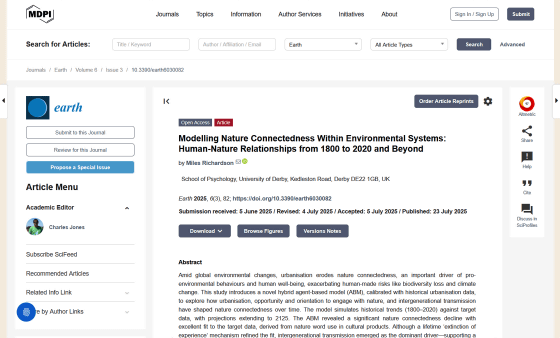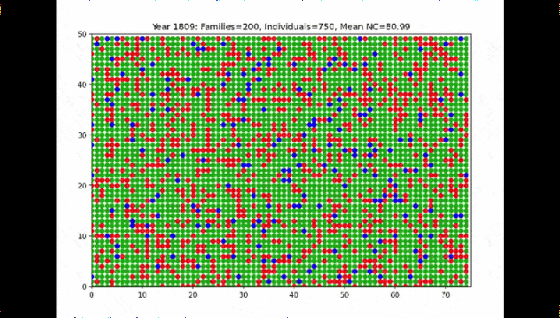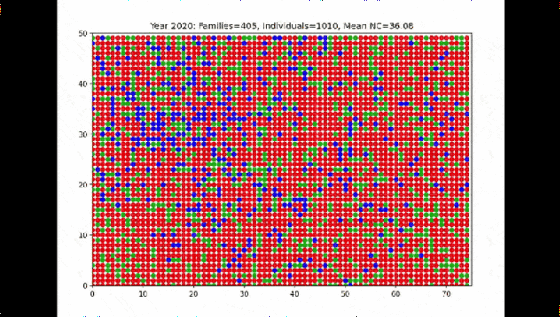Research results show that the 'language' used by humans to describe nature is disappearing

Although climate change and environmental destruction caused by human activities have become major issues in recent years, many people still do not feel strongly about environmental issues. One reason for this is that the relationship between nature and humans is becoming weaker. However, an investigation into the trends in words used in publications has revealed that humans are no longer using 'words to describe nature.'
Modeling Nature Connectedness Within Environmental Systems: Human-Nature Relationships from 1800 to 2020 and Beyond

Human connection to nature has declined 60% in 200 years, study finds | Environment | The Guardian
https://www.theguardian.com/environment/2025/aug/09/human-connection-to-nature-has-declined-60-in-200-years-study-finds
How we Lost Touch with Nature | Finding Nature
https://findingnature.org.uk/2025/08/11/model/
The Words Humans Use to Describe Nature Are Vanishing, Study Finds : ScienceAlert
https://www.sciencealert.com/the-words-humans-use-to-describe-nature-are-vanishing-study-finds
Miles Richardson, a professor of psychology at the University of Derby in the UK, points out that the breakdown of our relationship with nature is at the root of our environmental problems, and in a new study, he modeled and simulated this disconnect between humans and nature.
The following is Richardson's model of the disconnect between humans and nature. Nature connectedness is fostered by a person's strong direct attention to nature (dynamic attention) and by inherited experiences through their parents. In other words, the relationship between humans and nature is influenced not only throughout one's own lifetime, but also across generations.

When nature disappears from a local community and urbanization occurs, the connection between people living in the surrounding area and nature weakens, and this has ripple effects across generations. Richardson ran a simulation using this model to examine how the relationship between humans and nature has changed since 1800.
In the diagram below, which shows society around 1800, the green dots represent 'areas rich in nature' and the red dots represent 'urban areas where nature has been lost.'

By around 2020, areas rich in nature had decreased significantly, while urban areas had increased significantly. As time passed, we could see that the connection between humans and nature was becoming weaker and weaker.

To verify the results of this simulation, Richardson devised a method to track human interaction with nature over time using words that appear in books. Using the Google Books Ngram Viewer , which can investigate the frequency of words in publications since 1500, he examined how the frequency of words describing nature, such as 'river,' 'blossom,' 'moss,' 'bough,' 'meadow,' and 'coast,' changed over time.
The graph below shows the frequency of 'words describing nature' in publications published from around 1800 to after 2000. As we approach modern times, words describing nature are increasingly being used less and less, especially since 1850, when industrialization and urbanization progressed rapidly.

The graph below shows the frequency of nature-related words in publications (blue line) and the red line, which shows the relationship between humans and nature as simulated by the model. Richardson explains that the decline in human-nature interactions predicted the decline in nature-related words to within 5% error.

'These words reflect what people noticed, what they valued, and what they wrote about,' Richardson said. Between 1800 and 1990, the frequency of words describing nature declined by 60.6 percent.
However, the graph also shows a slight increase in the frequency of nature-related words since 1990. This may be due to recent trends in the publishing industry, but it also suggests that there may have been societal factors in recent decades that have had a positive impact on the connection between nature and humans.
'Our connection to nature is now recognised as a fundamental cause of the environmental crisis. It is also crucial to our own mental health, which links human well-being to nature's well-being. If we are to transform society's relationship with nature, fundamental change is needed,' Richardson argued.
Related Posts:
in Science, Free Member, Posted by log1h_ik







